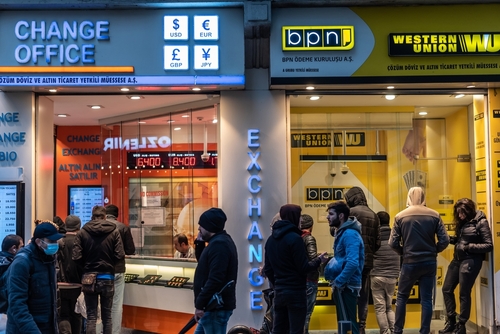|
|
Turkey’s inflation rate clocked in at 80.2 percent in August, rising from 79.6 percent in July to reach its highest level since 1998, according to the government’s Turkish Statistical Institute.
However, a consumer price index kept by the Istanbul Chamber of Commerce in the country’s largest city showed an annual growth rate of almost 100 percent last month.
The government has a record of reporting inflation’s rate as being lower than others calculate it to be.
Last year, President Recep Erdogan brought criminal charges against an independent group of economists who reported inflation to be significantly higher than Erdogan’s government would admit, as we reported in “Turkey: A Crime to Tell The Economic Truth?” (5 Oct 2021).
Meanwhile, the country’s central bank surprised economists by cutting its key rate last month to 13 percent.
Investments denominated in the country’s lira currency now earn a return of -67 percent.
In autumn 2021, central bank chief Naci Agbal tugged the bank’s key interest rate above that of inflation to give investors an incentive to take the lira seriously.
He, as well as a successor, were fired for their efforts, as we reported in:
- “Turkey’s Central Bank Governor Fired After Rate Hike” (23 Mar 2021)
- “Turkey’s Financial Markets Crash After Agbal Firing” (30 Mar 2021)
- “Turkey: Another Day, Another Central Bankster Fired” (1 Jun 2021).
Price growth will reach 85 percent before reversing sharply next year, emerging markets economist Liam Peach at Capital Economics predicted in a research note.
However, most analysts agree that price growth will not dwindle to the 9.9 percent annual rate the country’s financial officials predict will prevail in 2025.
Nureddin Nabati, Turkey’s finance minister, touted the fact that the inflation rate rose less than a percentage point last month.
“In the months ahead, we will witness inflation losing speed even more,” he tweeted last week. “We will drive high inflation out of these lands, never to return again.”
Economists expect global inflation to ease in 2023, but that will not be due to Turkish president Recep Erdogan’s odd notion that low interest rates keep prices from growing.
Turkey’s overall inflation rate last year was 19.6 percent but passed 50 percent in February.
As inflation soared, the lira tanked, losing more than a quarter of its value against the dollar so far this year after shedding 44 percent in 2021.
TRENDPOST: When Erdogan’s insistence on low interest rates at the central bank failed to curb inflation, instead of changing his policy he proclaimed his stance a “new economic model,” in which an increasingly worthless lira will make Turkey’s exports a bargain abroad, setting off an export boom that will bathe the country in prosperity.
So far, it’s not working. We have detailed the policy flop in:
- “Turkey: Interest Rates Down, Lira Crashing. War Next?” (19 Oct 2021)
- “Turkey’s Economy Continues to Implode” (14 Dec 2021)
- Turkey’s Central Bank Interest Rate Gamble (22 Feb 2022).
Even so, Erdogan is unlikely to change his policy: he has glued his public and political identity to the idea that interest rates must be kept low under all circumstances.
He has declared himself “an enemy of high interest rates,” which he calls “un-Islamic.”
Erdogan is up for re-election next summer and is watching his popularity vanish along with the lira’s buying power.
Therefore, he is likely to take increasingly desperate measures and to shift blame for his colossal failure. Already, he has pointed to “foreign” meddling in Turkey’s economy as a source of trouble.
Also, he has sought to distract Turks from his blunders by inserting himself on the international stage, most recently as a would-be peacemaker between Ukraine and Russia.
Worse may be ahead. As Gerald Celente often has said, “When all else fails, they take you to war.”

